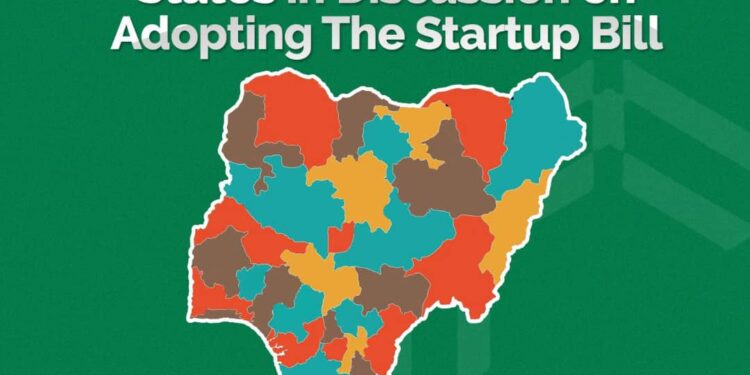The news: Six Nigerian states are currently in discussion to the adoption of the Nigerian startup Bill, which recently passed the third reading on the floor of the Nigerian Senate.
The states include: Lagos, Yobe, Kaduna, Ekiti, Edo and Anambra showcase a somewhat comparative advantage to other Nigerian states as they’re in their earlier discussion to accepting the bill.
Why it matters: The Bill intends to provide an enabling environment for the operation of startups in Nigeria, enable the development and growth of technology-related talent, and lastly position Nigeria’s startup ecosystem, as the leading digital technology center in Africa.
The proactive measures of these states to discuss the adoption of the bill show that Nigeria is on the move to positioning itself as the giant of Africa, not just in music or sports but also, in the tech ecosystem in the continent.
The position of the states: These various states in the recent months have housed startups, launched government programs to boost the tech industry and also, enabled growth around its states.
Lagos: For instance, Lagos (which is deemed as the Tech Capital of Nigeria), houses over 500 emerging startups (and counting). It is ranked as the 81 in the world of tech, according to StartupBlink. These startups were cut across all the frontiers of foodtech, e-commerce, fintech, healthtech, edtech and more. So, it is no surprise that it was amongst the first discussants for the adoption of the bill.
The state has proven to provide an accommodative environment for budding startups, becoming the land of opportunities.
Kaduna: Kaduna on the other hand is slowly becoming the model northern northern state. With the launch of Kaduna Technology City (KTC) – home to CoLab Innovation Campus (the first innovation hub in Kaduna and the second in Northern Nigeria after nHub Jos), Kaduna is arguably the tech hub of Northern Nigeria.
Furthermore, Zipline – an American company that designs, manufactures and operates drone deliveries with distribution centers in the United States, Japan and Rwanda launched in Nigeria. The launch in the state made Nigeria the third African country to deploy the drone medical deliveries initiative.
Edo: Edo state has inaugurated a Board of Directors for Edo Innovates, to drive the next phase of development of the state’s innovation hub to launch and support careers in technology and innovation in the state.
The board is chaired by Victor Asemota, the Founder and Chief Executive Officer (CEO) of Swifta Systems and Services, and also has Peace Itimi, Senior Special Assistant (Digital Transformation) to President Muhammadu Buhari as member.
According to Godwin Obaseki, the governor of Edo state, “Edo Innovates is an initiative of the Edo State Government with an objective to leverage skills development and investment promotion in tech for job creation. Over the years, the innovation cluster has attracted multiple local and international partnerships to launch thousands of young people in Edo State into careers in technology.”
Anambra: In Anambra state (and southeastern Nigeria), there has been low internet penetration, accounting to 13.7 million users. However, past governments have sought to change this, following the waiving of right-of-way charges for telecommunications in the state.
Currently, the Soludo led administration has appointed Fred Agbata – the co-founder of GoDo Hub for a four year tenure by the Anambra state government to head the Anambra State ICT Agency, which has been received with mixed reactions. Agbata’s tenure is expected to use his experience to aid the government’s plan of building a silicon city. In building this, his office will see to expanding broadband access, digitising government services, and supporting technology startups in the state.
Explaining his plans to fulfilling the expectations, Agbata said, “With my industry experience, I will be able to quickly launch new programs, attract the right partners, strengthen the tech and developer communities, organise programmes and meetups, and tons of other initiatives and activities that will benefit both Anambra State and Nigeria”.
Ekiti: The state of technology in Ekiti state is on a progressive side following the launch of a tech centre – a non-profit technology hub developed to equip youths of Ekiti in the Q1 of 2022.
The hub will train youths with the necessary 21st-century tech and entrepreneurship skills to become nation-builders.
Conclusion
With discussions from these states, one is expected to see a thriving tech ecosystem in the coming months; having new founded startups, eased government regulations and backing and an enabling environment for investors and investments.

































